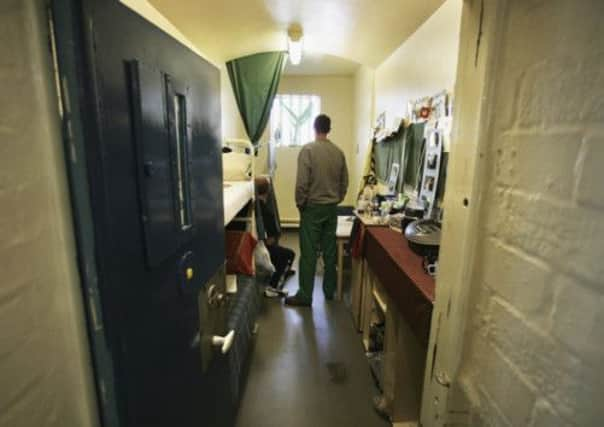Scottish independence: SNP ‘weak’ on inmate votes


The Very Rev Dr Andrew McLellan said the measure has “no punishment value” and won’t teach inmates to behave like “good citizens.”
SNP ministers have insisted that the referendum is exempt from a 2004 European Court judgement which ended the blanket ban on inmates voting in normal elections.
Advertisement
Hide AdAdvertisement
Hide AdOpposition parties at Holyrood will today attempt to make changes to the franchise for the referendum to allow prisoners serving shorter sentence to get the vote on 18 September next year. Ministers are also facing a legal challenge from prisoners who want the vote.
Mr McLellan, a former Church of Scotland moderator, says in a Scotsman article today that the 2004 ruling made it clear that inmates could not be deprived, on a universal basis, from voting.
But he said: “What has happened since, however, is that many people have shouted loudly that it is permissible to try to get round the law if you don’t like it.”
In Scotland, he says this is “about whether a judgment about voting does or does not apply to a referendum.”
Instead of attempting to avoid the law, the Scottish Government should be ready to “uphold the law” even if it doesn’t like the European Court judgment.
“Where prisoners are concerned, it is essential to show that respect for the law is paramount and that it is a sign of weakness to try to find wriggle room,” he added.
Mr McLellan insists that banning all prisoners from voting has no “deterrent or rehabilitative” value. “If prisoners are to be rehabilitated into society they need to learn to behave like good citizens,” he adds.
The Lib Dems and Greens will both attempt to change the franchise bill for the referendum at Holyrood today to allow prisoners serving shorter sentences to vote.
Advertisement
Hide AdAdvertisement
Hide AdLiberal Democrat justice spokeswoman Alison McInnes said: “It seems disproportionate to deny someone serving a short sentence a say in the future of their country. It seems nonsensical and arbitrary that someone sentenced in the summer will be shut out of this decision whilst someone caught in the spring will be allowed to vote.”
A range of figures from the worlds of law, justice, academia and the arts made a bid to persuade MSPs to back prisoner votes for the referendum in an open letter earlier this year.
Leading human rights lawyer Tony Kelly has said that a legal challenge to the blanket ban in the referendum is likely. He says he has been contacted by an unnamed inmate wanting to fight the ban. .
The Howard League Scotland backs a degree of prisoner voting, saying the UK is out of step with most of western Europe in upholding a blanket ban. In a briefing note for MSPs, Howard League Scotland said: “We make this as a moral case, not a legal one. There is an opportunity for the parliament to put down a marker about the value placed on democratic rights, social justice and effective rehabilitation in Scotland.”
They added: “The question of voting rights for prisoners in the referendum is more acute than in general elections. This vote will determine the constitutional future of their country and may not be repeated in their lifetime.”
A Scottish Government spokeswoman said: “The Scottish Government does not agree that convicted prisoners should be able to vote while they are in prison.”
Where the parties stand on giving prisoners the vote
Labour: against
Labour’s position is that the election criteria for the referendum vote should be no different from ordinary circumstances so doesn’t believe that prisoners should be able to vote in the referendum. It says there has been no solid argument for changing this position, but it has called for the Scottish Government to publish any legal advice they have had on this issue.
SNP: against
The Government does not believe that prisoners should be able to vote in the referendum, and the bill makes provision to that effect. Ministers say there is no legal obligation under the European convention on human rights to give prisoners the right to vote in a referendum, even if there is a question mark over the future of the blanket ban on prisoners voting in elections.
Lib Dems: for
Advertisement
Hide AdAdvertisement
Hide AdThe Lib Dems insist a blanket ban would be neither coherent nor progressive. The party wants a serious look given to the prospect of giving some, short-term prisoners a vote in the referendum. Lib Dems insist that the exclusion of prisoners from the poll is contrary to the primary aims of prison – re-integrating offenders into society, and helping them to better understand their civic responsibilities.
Greens: for
The Greens have insisted that prisoners voting could be seen as part of their rehabilitation and that there is a moral case in favour of it. Party leader Patrick Harvie has also claimed that even if there’s a case for maintaining some degree of banning prisoners from voting, that should be for a court to decide.
Conservatives: against
The Tories say if someone sacrifices their right to live freely in society, through criminal acts, then other consequences must follow. It is proportionate and right that one of those consequences is the loss of the right to vote. The party believes most people consider it objectionable that someone in jail for breaking the law, should in prison continue to have the right to influence making the law.
SEE ALSO